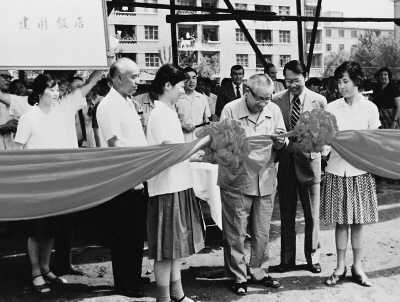By Wang Qian
Overseas Chinese provide "scarce items" to their hometowns
At the start of reform and opening-up policy 30 years ago, China faced a great scarcity of materials. Public transport was far less developed than today. Even a bicycle was not something that every household could afford, far less a car, reported People's Daily in an article published on October 14.
At the time, overseas Chinese were among the first to respond actively to the call of the opening-up policy. Many overseas Chinese and compatriots from Hong Kong and Macao returned to their hometowns. In order to solve the problem of transport, many chose to donate automobiles to their hometowns. In Henan Province, Hong Kong compatriot Tan Xianguo donated three vans to his hometown, Xingyang City. Subsequently, between 1984 and 1986, 22 overseas Chinese donated 56 automobiles to Zhengzhou, the capital city of Henan Province. In addition to vehicles, overseas Chinese also donated nylon cloth, fertilizers, chemical fibers, medical equipment, motorcycles, and refrigerators, as well as agricultural machines. "Scarce items", including televisions, washing machines, sewing machines, and radios reached some families with the return of many overseas Chinese and directly changed the daily lives of ordinary Chinese people at the time.
One dollar hotel
As well as the arrival of scarce items, personal exchanges with other countries also increased. In the summer of 1978, the National Tourism Administration asked help from Liao Chengzhi, the director of the Overseas Chinese Affairs Office of the State Council, telling him that the Beijing Hotel was fully booked and some foreign guests had no place to stay. (At that time, very few hotels were available to accommodate foreigners in Beijing.)
 |
|
In June of 1980, Liao Chengzhi (middle of front row) cut the ribbon at the founding ceremony of Beijing Jianguo Hotel.
|
Liao Chengzhi then introduced a relative - overseas Chinese Chen Xuanyuan - to the Administration. Following negotiations, each side agreed to invest US$10 million in building a new hotel, and Chen Xuanyuan would transfer his 49 percent shareholding to the Chinese side at the cost of one US dollar after the hotel had operated for ten years.
On March 29, 1982, the construction of the first hotel with joint funds from overseas Chinese and the Chinese side - Beijing Jianguo Hotel - was completed. Ever since, hotels funded jointly by overseas Chinese and foreign funds have flourished in China. Those who visit China no longer need to worry about accommodation.
During the past 30 years, the investment range of overseas Chinese has developed from labor-intensive to capital or technology-intensive industries and has expanded from the hometowns of overseas Chinese to coastal areas, from coastal areas to inland, and from the east to central and western China, eventually leading to the all-round opening-up of China. Overseas Chinese businessmen and their enterprises have made an enormous contribution to the expansion of "Made in China" products throughout the world.
Nowadays, investing in China has become a trend for overseas Chinese. Li Guixiong, head of the Thailand Chinese Youth Chamber of Commerce quoted statistics from the Chamber indicating that over 80 percent of young overseas Chinese businessmen in Thailand have returned to their motherland to invest.
Although the statistics are incomplete, enterprises founded by overseas Chinese and compatriots from Hong Kong and Macao account for around 70 percent of the total of overseas-funded enterprises in China.